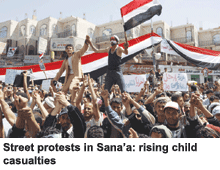Mohammed Munif’s three daughters were stunned by the sight of their teacher bleeding from the head after being hit by a stone during a protest, and further traumatised when their 12-year-old brother Ahmad was hit by a stray bullet in Yemen’s highland city of Taiz on April 3.
 Still wearing his blood-stained uniform, according to Ahmad the bullet was fired as security forces used live ammunition to disperse an anti-government protest heading towards the presidential palace. For the three girls, aged 7-11, the incident has heightened their fears. “My eldest daughter Sarah saw her female teacher bleeding from her head after ‘thugs’ hurled stones at a female teachers’ protest in end March,” says Mohammed Munif (40). “Now, she is scared. She refuses to go to school without my escorting her.” Many other children in Yemen (pop.24 million) have been affected by the violence that has accompanied nationwide protests which began in February against the prolonged 33-year rule of President Ali Abdullah Saleh.
Still wearing his blood-stained uniform, according to Ahmad the bullet was fired as security forces used live ammunition to disperse an anti-government protest heading towards the presidential palace. For the three girls, aged 7-11, the incident has heightened their fears. “My eldest daughter Sarah saw her female teacher bleeding from her head after ‘thugs’ hurled stones at a female teachers’ protest in end March,” says Mohammed Munif (40). “Now, she is scared. She refuses to go to school without my escorting her.” Many other children in Yemen (pop.24 million) have been affected by the violence that has accompanied nationwide protests which began in February against the prolonged 33-year rule of President Ali Abdullah Saleh.
School heads are concerned the escalating violence is adversely affecting not only students’ attendance, but behaviour and performance as well. “Children are becoming more aggressive and have a greater tendency to fight,” Jamila al-Mujahid, principal of the Sana’a-based Muadh Ibn Jabal School, told the United Nations Children’s Fund (Unicef).
According to local NGO Seyaj Organisation for Childhood Protection (SOCP), at least 22 children were killed and more than 200 injured during the protests in March this year, while Unicef estimates 19 children have been killed since the protests began. “This is an estimated 20 percent of the total number of casualties and is very alarming,” says George Abu-Zulof, a Unicef child protection specialist. Of the 52 people shot dead during a massive crackdown on protesters in front of Sana’a University on March 18, at least two were children — killed within 250 metres from their home.
Speaking to the Yemen Observer Samir al-Mathaji, general secretary of the NGO My Childhood Organisation, accused all political organisations, including the six-party opposition coalition known as the Joint Meeting Parties (JMP) and the ruling General People’s Congress party (GPC), of using children in demonstrations. “This is a breach of all international conventions on child rights, since children are not aware of the purposes of these demonstrations,” he says.
Education minister Abdul-Salam al-Jawfi has warned that the government will punish all persons involving children in protests and called upon protesters to respect schools. “We will not be lenient with irresponsible individuals attempting to undermine the educational process,” he said, following reports that some protesters in Aden had threatened to burn down schools if teachers and pupils refused to join the protests.
(Excerpted and adapted from www.irinnews.org)